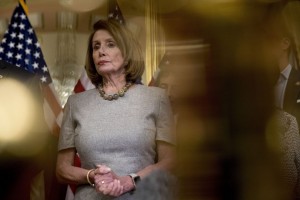from The Gray Area:
3/22/24; updated 3/23/24:
The House approved a $1.2 trillion measure today to fund large parts of the government for the rest of the fiscal year and sent the bill to the Senate for final approval before it is presented to President Biden for signature to avert a shutdown of the government at midnight tonight.
The Senate passed and Pres. Biden signed the 'shutdown spending' bill at 2am. Here is how each Senator voted.
There was never any real opportunity to make the needed reductions to government spending that
Republican's desire. A shutdown, which many Republicans were okay with, would have resulted in a later 'cave" by those same Republicans under pressure to reopen the government. Why? The Republicans don't have the votes and the Democrats always vote in a block. That Democrat block of voters is committed to continuously increasing government spending. This has been the case in our government for decades, getting exponentially worse in recent years. The federal debt is now
34 trillion dollars and 121% of our GDP! It has become
a threat to our national security. We have all seen the fallacy of those policies the last 3 years, but without the votes, or another strong negotiating point, in addition to a shutdown, it can not change.
Among
many other BAD parts of these spending bills were
earmarks. These earmarks included funding for things like:
$400,000 for an organization that gives out “transition” clothing for minors in Wisconsin
$2 million+ for equipment at facilities performing abortions
$1 million for “Amplify Latinx” business groups in Massachusetts
$850,000 for LGBTQ Senior Housing services and programming in Massachusetts
$740,000 to “increase diversity” in state contracts in Maryland
$10 million for an Alaska Leaders Archive
All of this chaos at the Capitol that has gone on for decades proves our government is not only mismanaged, but completely unmanaged. The fools resident at the Capitol and elected to do a job have failed. Those resigning from both parties understand this. Those coming in understand it too, but due to ideology, not service to the country, cannot or will not agree with each other. A unified government, all three branches, is the only way to fix this.
There is no question that federal spending is out of control. There are only three ways out of national debt: inflation, taxes, or both. This threatens not only our national security, but our quality of life.
We can expect the same failure of leadership when budget negotiations re-emerge at the end of this year.
The Wall Street Journal explains the details of this budget bill below, which appears certain to get President Biden's signature late tonight or early tomorrow.
from The Wall Street Journal,
3/20/24:
‘We have to govern,’ says House speaker Johnson.
House lawmakers approved a $1.2 trillion package of spending bills Friday over significant Republican opposition in the GOP-led chamber—sending the bill to the Senate, where lawmakers were working to pass the measure by a midnight deadline to avoid a partial government shutdown.
The House vote was 286 to 134, barely exceeding the two-thirds supermajority needed to approve the bill under a special procedure needed by House Speaker Mike Johnson (R., La.) to bypass internal GOP divisions in his razor-thin majority.
Most Democrats backed the measure, while more than half of Republicans were opposed, underscoring the divided state of the Republican conference and highlighting how Johnson has had to rely on the opposition party to keep the government funded.
Republican lawmakers huddled in tense discussions on the floor as the tally ticked higher, with House Democrats ultimately providing 185 votes in support. Republicans provided 101 yes votes, while 112 Republicans and 22 Democrats voted no.
Rep. Marjorie Taylor Greene filed a motion Friday to oust Speaker Mike Johnson from his post just five months into his tenure but didn’t move to force a vote, the latest dramatic twist for House Republicans, whose internal warfare already has ended one GOP speakership this Congress.
The bills being voted on Friday would approve funding for the Defense Department and several other federal agencies for the rest of fiscal 2024, wrapping up a drawn-out, contentious process that has brought the federal government to the brink of a shutdown several times since late last year.
Congress funds the federal government by passing 12 appropriations bills each year, splitting up the budget among different agencies, commissions and boards. Lawmakers passed a $460 billion set of
six spending bills earlier this month.
If the Senate doesn’t pass the package by late Friday, there would be a partial shutdown starting Saturday. A partial shutdown of a few hours or on weekend days would likely be unnoticeable to the public and to federal workers. Even in longer shutdowns, many essential government services will continue, such as Social Security payments.
Leaders from both parties said they scored wins on key issues during negotiations, even as the overall spending levels didn’t significantly budge from the totals set last spring during debt-ceiling talks.
- Democrats said they fended off cuts to education, labor and health programs,
- Republicans said they successfully reduced spending on foreign aid and nonprofit groups that help migrants—and clawed back funding from the Internal Revenue Service.
More From The Wall Street Journal (subscription required):
More From The Wall Street Journal (subscription required):
More From The Wall Street Journal (subscription required):
More From Breitbart.com:




